Raising Muscovy Ducks
This post may contain affiliate links, view our disclosure policy for details.
Raising Muscovy ducks is very easy. They are easy to care for, friendly and a great dual-purpose duck to have on the homestead. In this post, you’ll find all the information that you need about raising Muscovy ducks.
I’ve been raising Muscovy ducks for a few years now and I can tell you, hands down, it’s the easiest animal I have ever taken care of. Or in other words… They pretty much take care of themselves.
I started my Muscovy duck journey with two females (hens) and one male (drake) that my ex-husband picked up from friends and this trio multiplied very quickly and became a great source of food for us.
But there is so much more to Muscovy ducks than just food production! We are going to go over all the benefits of raising them and all the questions that you might have. Let’s jump in!
Raising Muscovy Ducks…
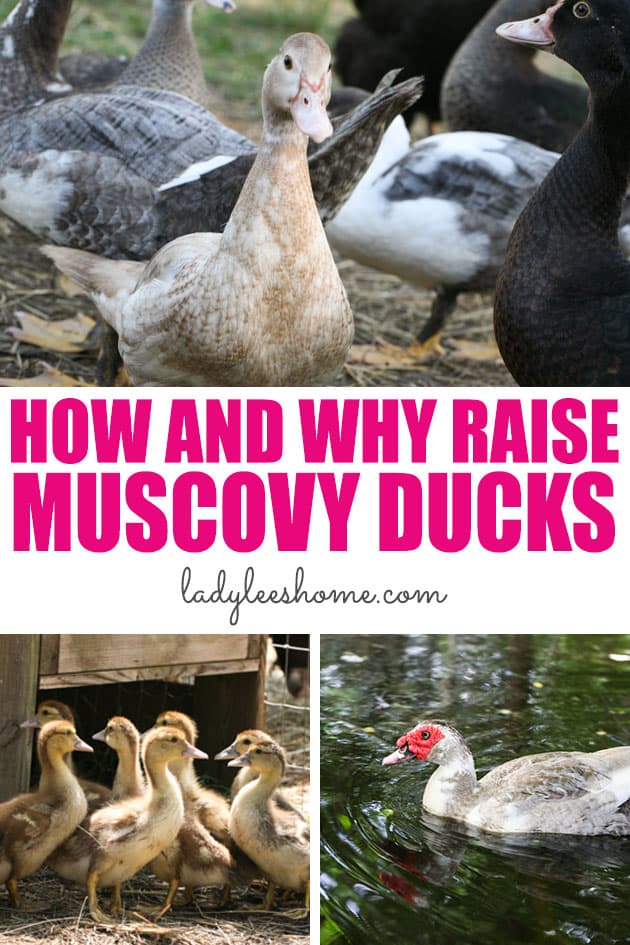
I am going to try to answer all the questions that you might have about Muscovy ducks. I hope that if you are considering this amazing breed of ducks this post will give you all the info that you need to make a decision.
If at the end of this post you have additional questions, feel free to post them in the comments.
Origin of Muscovy Ducks…
Muscovy ducks are native to South America and you can still find them roaming around wild in the jungles there.
Their original name was Musco ducks because they eat so many mosquitoes. The Russian Muscovites were the first to import them into their country and raise them domestically; this is where the name Muscovy came from.
They are the only duck that is not derived from the mallard duck. In fact, they are not considered a duck. They are a large waterfowl, something between a goose and a duck.
What do Muscovy Ducks Look Like?
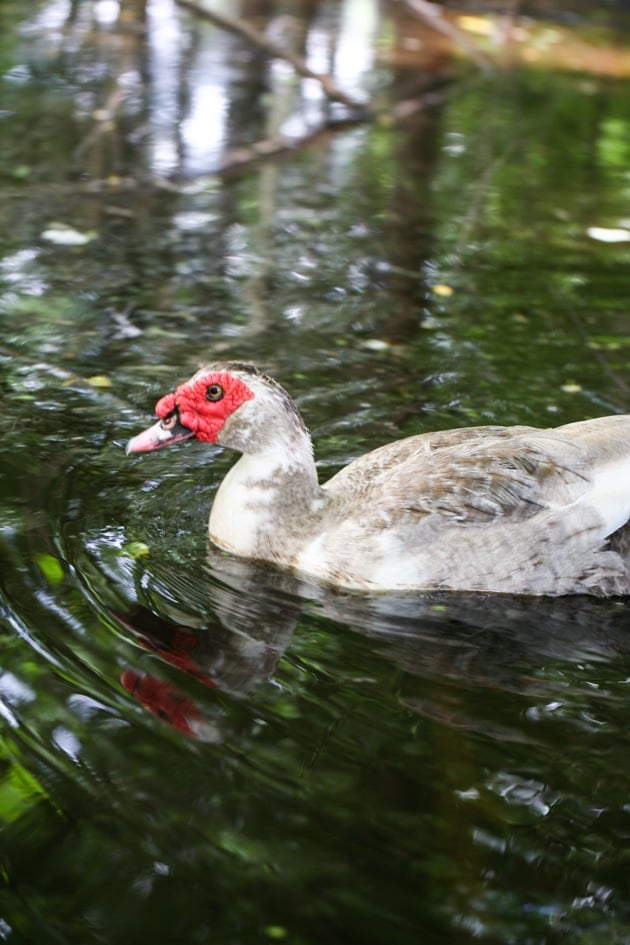
One of the most known characteristics of Muscovy ducks is their large red, warty caruncles on their head. They appear when the duck reaches maturity around 5-6 months of age. The male Muscovy has a larger mass of them while the female only has a red mask around her eyes.
Note that in this post, you’ll see a lot of pictures of my Muscovy ducks without the red, warty caruncles, this is because they are still young, probably around 4 months of age.
Muscovy males are large. They can reach 15 lb while the females are smaller and can reach about 9 lb.
Muscovies have many different and beautiful colors. They can range from black to brown to grey or white or tan and one duck can have more than one color.
Do Muscovy Ducks Quack?
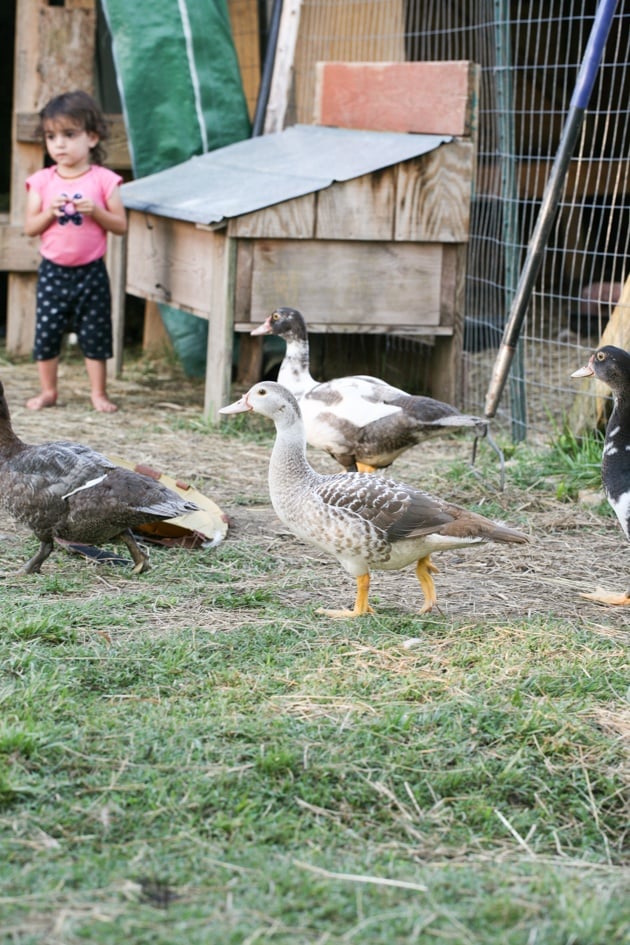
No! Muscovy ducks don’t quack. They do make a hissing noise mainly when they talk to each other but it’s not a loud noise. For the most part, they are very quiet ducks.
This might be a pro or it might be a con to owning Muscovy ducks depending on what you like. I generally prefer quiet! I owned Guinea fowl before and just about lost my mind with the amount of noise they made.
What do Muscovy Ducks Eat?
Muscovy ducks eat chicken feed, bugs, flies, mosquitoes, greens and kitchen scraps, bread and pasta, and fish.
If your Muscovy ducks are free-range, they don’t need you to feed them a whole lot even when they are very young. They will clean your yard of ticks and other nasty bugs.
You’ll see them eat some grass and other greens (yes! They will eat your garden if they can access it) as well.
But maybe the best thing about Muscovy ducks is that they love eating flies and mosquitoes! You’ll literally see the ducks catch the flies in the air as they fly by. When it comes to mosquitoes, they’ll either eat adults or they’ll eat them at the larva stage.
Let me tell you a story… I moved to my house in the country in 2016. The house was abandoned for 7 years. There was trash everywhere, standing puddles of water, and an overgrown lawn.
Right next to the house there is a pond. But it’s not really a pond, more like a swamp. It’s shallow and fills and dries depending on the rain.
A perfect breeding ground for mosquitoes, ticks, chiggers and so on.
Even though we cleaned the place, it was still impossible to sit outside on the porch, the mosquitoes were just unbearable! This went on for a year. Then, we got our three Muscovies… Within 3 months, the place was cleaned up completely.
Since then, I have maybe 10% of the flies that I should have with all the livestock around me and not a single mosquito in sight! For me, this is a great reason for owning these amazing ducks!
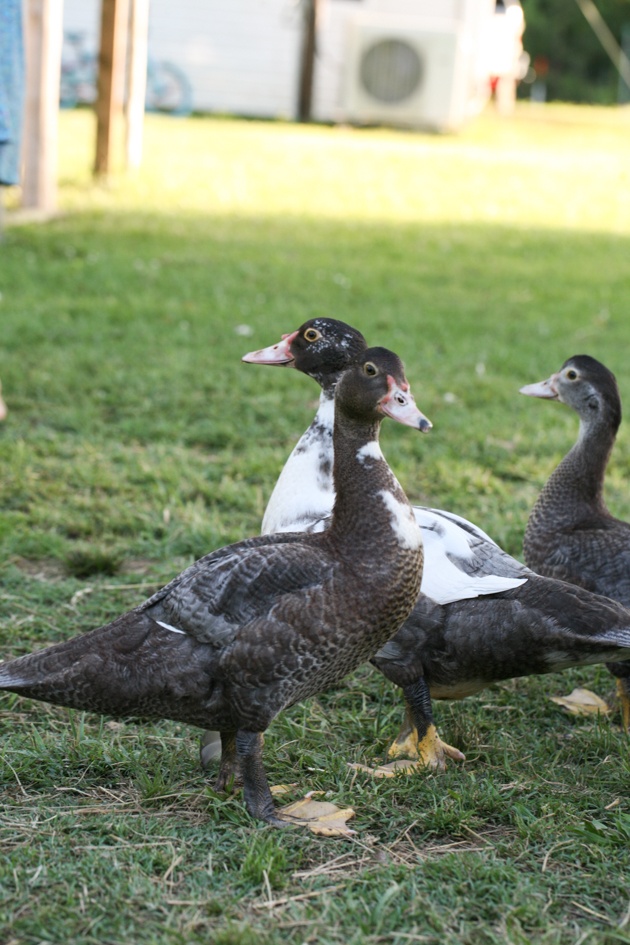
Even though they can forage and take care of themselves, I still feed my free-ranging ducks a couple of cups of chicken feed in the morning, just to get them used to me and to a routine.
If your Muscovy ducks live in a fence they will depend on you to feed them…
Ducklings – ducks grow very fast and so they need feed that is rich in protein. Non medicated chick starter feed with 20-22% protein is a good choice. Feed it free choice.
Young ducks and adults – I find that after the first three weeks Muscovy ducks can transition to adult feed with no problem. Feed 16% protein chicken layer feed either free choice or at least eight ounces per duck per day.
You can also feed your ducks corn, herbs, kitchen scraps, weeds, old bread, fish, old cheese, and so on.
Always make sure that your ducks have plenty of water! Muscovy ducks love washing themselves and they drink a whole lot. Like any other duck, they make a mess of the water so make sure to clean and change the water daily.
This is a great article on how to feed ducks if you want to dig even deeper.
Do Muscovy Ducks Need Shelter?
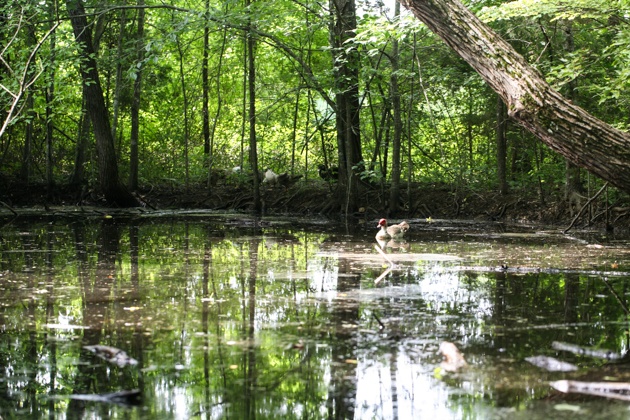
Muscovy ducks only need shelter for their nests or if you live in a very cold climate. They don’t mind the rain, they don’t mind the cold, they don’t mind the snow, and they don’t need you to supply them with roosting bars because they prefer the ground.
They are very hardy ducks and easy to care for! My ducks do have shelter but I never see them use it. I’ll see them stand in the rain and enjoy it. Even when we get some snow, they still stay outside.
Now, I am in the South and it never gets below zero here. We also don’t have a whole lot of snow. Maybe if you live in Alaska it makes sense to make sure that they have a protected place to hang out in during the winter.
However, they do need a protected place for their nests. Something like a nest box or access to the floor of the chicken coop or maybe access to an old shed or some sort of outbuilding. My free-ranged ducks love making a nest in my dog’s house! You’ll learn more about their nests below.
Are Muscovy Ducks Friendly?
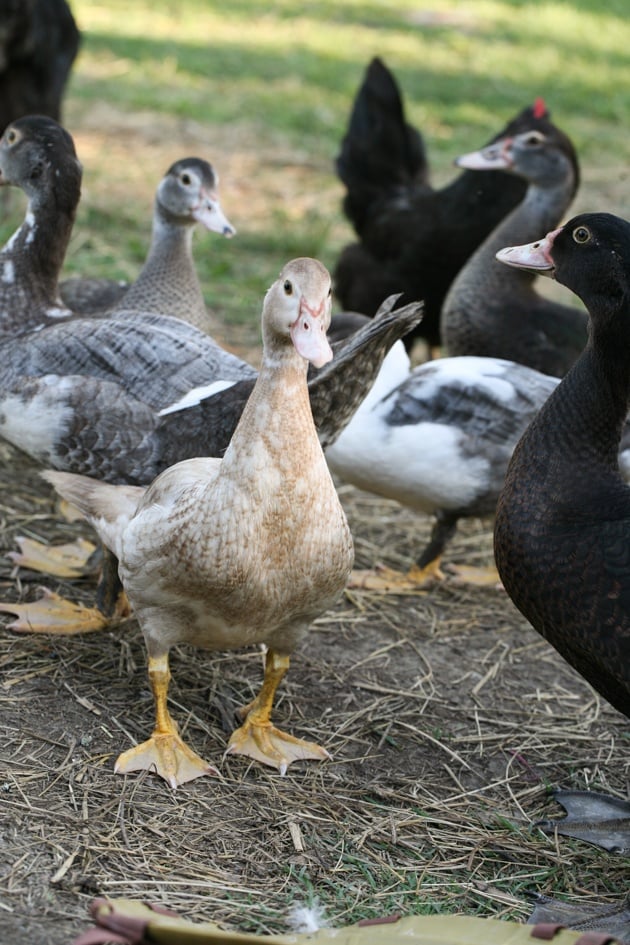
The only time that Muscovy ducks are not friendly is when they have their young with them. A mother Muscovy duck will try to make sure that no one gets closer to her ducklings. Other than that, they are VERY friendly ducks!
They will eat from your hand and follow you everywhere like dogs. They are very slow (which makes them easy prey if they are free-rangers) and easy to catch.
They generally get along very well with other animals! I raise my ducks around my dog and cat and they live with the chickens and goats.
They get along very well with the other animals. Usually, it’s the chickens that are mean to them and I need to keep an eye on and deal with a mean hen.
Between them, they get along very well. The only time that I had an issue was when I had too many drakes in one fence. They kept fighting with each other and with the roosters and I had to get rid of a few. This is normal behavior for most animals.
If your Muscovy ducks are fenced, make sure that you don’t have more than one drake for four hens.
When do Muscovy Ducks Start to Lay Eggs?
Muscovy ducks start mating and laying eggs around 7 months old. The female chooses a location for her nest and keeps coming back to the same nest. If you have a few females, each one of them will have her own nest.
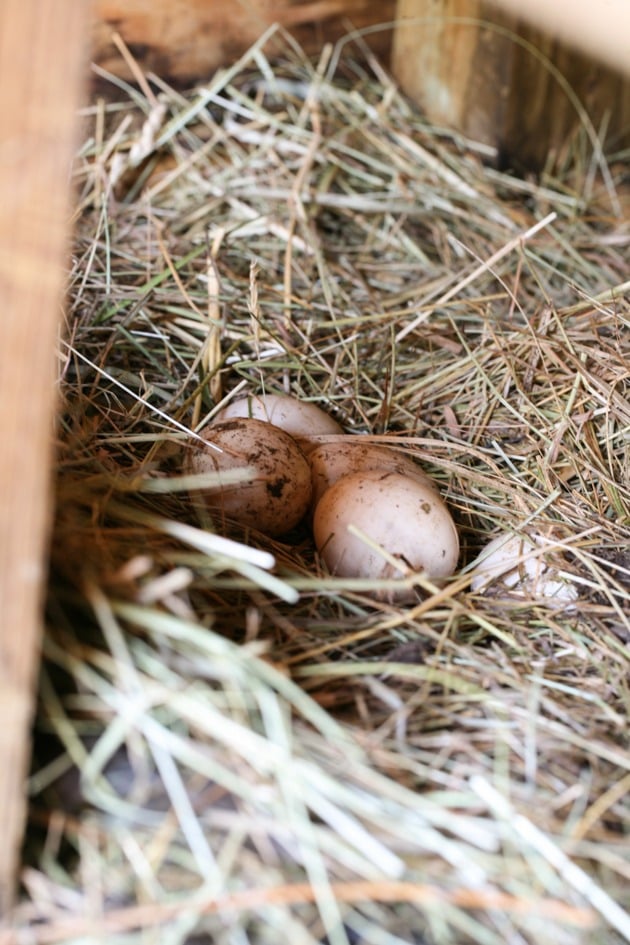
They mostly make their nests on the ground in a protected area. They might choose to make their nest under the goat’s milk stand, in an empty bin, or under the wooden pallet that holds the hay bales.
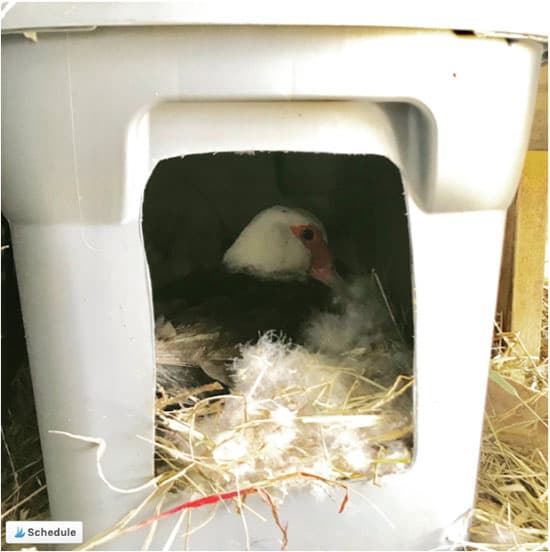
They pluck some of their breast feathers and use straw to make their nest.
They lay one egg a day in that nest and if you leave the eggs in the nest, the hen will start sitting on the nest when it has 6 or more eggs. Most of my hens go broody when the nest is 12 to 17 eggs large.
It takes 35 days for Muscovy duck eggs to hatch. During those days the hen doesn’t always stay on the nest. She might leave the nest for a little while and go to eat or wash.
This might be a little strange if you are used to chickens. Broody hens will not leave the eggs and chicken eggs have to keep a certain constant temperature in order to hatch.
At first, when I saw my broody Muscovy hen get up and leave her nest I thought that the eggs were ruined. But trust the duck and don’t touch the eggs! She will be back and all will be fine. She knows very well what she is doing!
You can watch a video of my first Muscovy ducks hatching on YouTube HERE.
Muscovies do not lay eggs year-round. They start when the weather starts to get warm in the spring and stop when the weather cools down. Here in the South, their season is between March to October. Then they will take a break for the winter.
During their season, they can sit and hatch two to three nests. If each nest has 10-15 eggs in it you can imagine how fast the Muscovy population in your homestead can take off.
I manage that by collecting some of the eggs and butchering some of the ducks.
Are Muscovy Ducks Good Mothers?
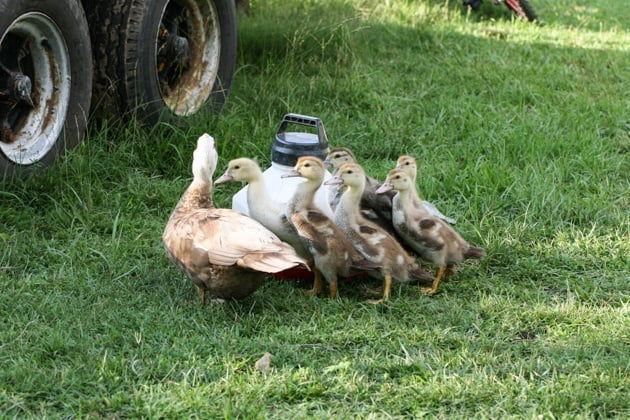
Muscovy ducks are the best mothers. They take very good care of their young and they are very protective of them. In fact, Muscovy mothers are pretty aggressive and won’t let anyone close to their babies!
Once all the eggs hatch the mother will spend two more days in the nest with the babies. She will clean her babies and won’t leave them for a moment. She doesn’t show up for feeding those days and I don’t feed her or bring her water. I just let them be.
After a couple of days, they will leave the nest and just walk around. Sometimes they come back to the nest for the night and sometimes they find another spot.
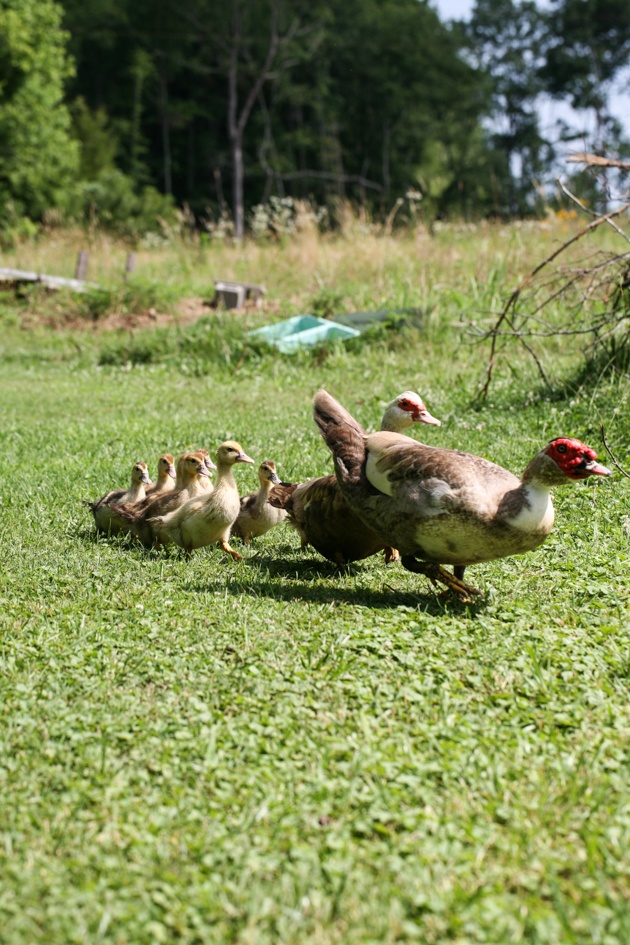
The young ducklings will always stay behind their mother. If your ducks free-range they’ll walk around and hang out by a water source like a pond if one is available.
Take into consideration that the little ducklings are very easy prey. Many times I had mothers go into the woods with 10 ducklings and come back with 6.
You can choose to grab them after they hatch and move them to a brooder for a few weeks for their protection. Make sure to relocate the mother as well so she knows where her ducks are.
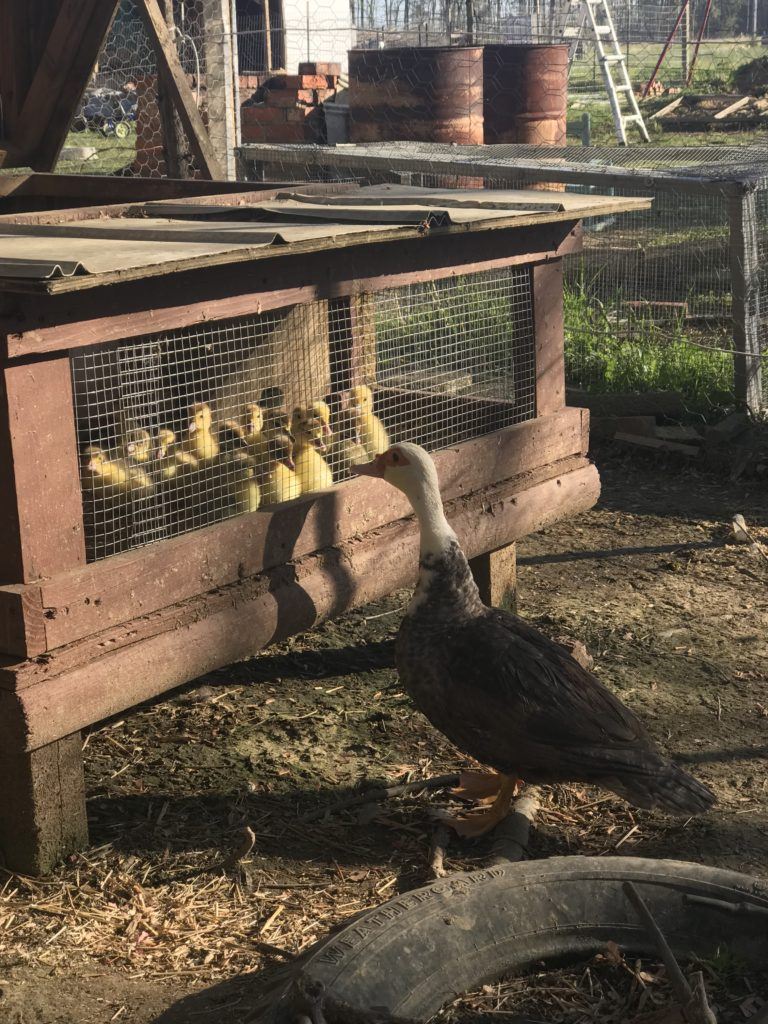
I sometimes move them to a brooder that has an open top. This way the mother can fly in and out. She can go wash and eat and come back.
If your ducklings don’t free-range, you’ll have to make sure that they have water and feed. Make sure that the water dish is not deep. They will most likely play in the water and if it’s deep and there is no easy way for them to get out they will drown.
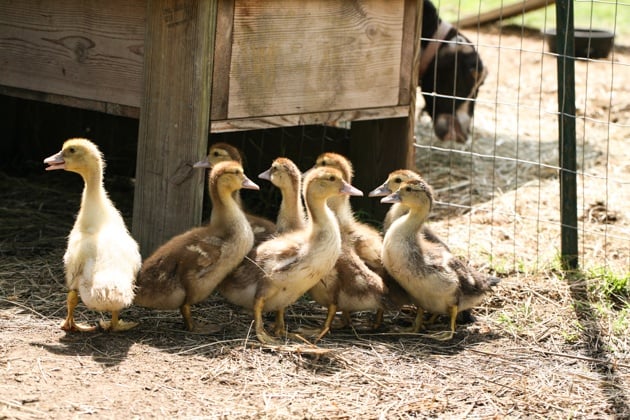
Ducklings grow very fast and somewhere between four to six weeks they no longer need their mother. She will take a little break and then she’ll start mating and laying eggs for the next nest.
How to Tell the Sex of Muscovy Ducks…
When Muscovy ducks reach maturity it’s easy to see which one is a hen and which is a drake. The drakes are considerably larger than the hens and they have a larger mass of red caruncles on their head.
When they are young ducklings, sexing is a bit more difficult. I look at their tail. The drakes will have a much fatter tail than the hens. Still, it’s not easy to sex them when they are young.
This video will show you how to sex day old ducklings. I’ve never tried it but this might be a reliable method.
Do Muscovy Ducks Fly?
The drakes can fly but not very well since they are pretty heavy-bodied. I see my male ducks fly very low, just a few feet off the ground and not very far or often. The Muscovy hens fly very well.
The hens fly all over and around the homestead and often land on the roof of the house and just hang out there for a while, walking from here to there.
It’s very cute to see them up there on the roof but not always a great thing… I have a friend that is now dealing with a leaking roof because the ducks messed with the seal around the vents.
If you don’t want to have your ducks free-range and fly and prefer for them to be fenced and not fly around, you can clip one of their wings just as you would do with chickens. I show how to do this in my post about clipping chicken wings.
Will Muscovy Ducks Fly Away in the Winter?
Muscovy ducks don’t care much about the cold and even though they are a wild kind of duck, they are also very domesticated and love having a home. They don’t fly away in the winter.
I have never had my ducks take off even though they were free. They love staying around the house. They come back every morning to eat the feed that I throw on the ground for them. They make their nests around the homestead even though they can go and find a hollow log or a bush nearby.
I do get emails and comments from people who walked out of their house one day and found a Muscovy duck by their pond (check the comment section of this post). So I guess that sometimes they do fly around but for the most part, if you provide them with a good home they will stay around the homestead.
Raising Muscovy Ducks For Egg Production…
Muscovy ducks are not an egg-laying machine. Not at all and I don’t recommend choosing them if egg production is your main goal. A hen might lay 80-120 eggs a year.
Don’t get me wrong, their eggs are amazing. They are the size of a very large chicken egg, the shell is creamy white and very strong, and the yolk takes most of the space in the egg. Their eggs are rich and very tasty.
We eat their eggs just as we eat chicken eggs and I also use them for baking (they make the best baked goods! I use them in my pumpkin bread, sweet potato bread, apple cake, challah bread, or any other bread or cake that calls for eggs).
They just don’t lay a ton of eggs which is the reason that I won’t keep them mainly for egg production.
Raising Muscovy Ducks For Meat Production…
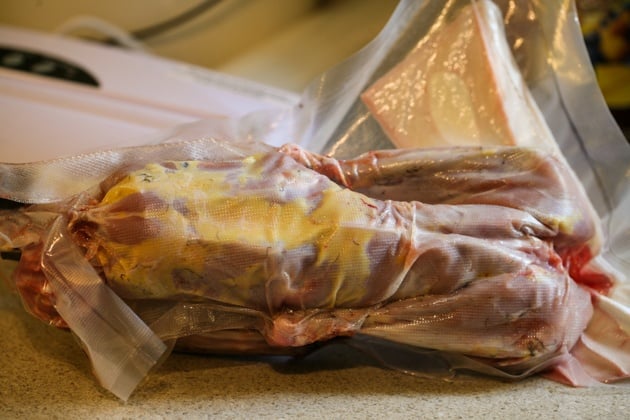
Muscovy ducks are a great source of meat especially for those of us who are looking to become more self-sufficient. They might take a little longer than other breeds of ducks to mature but they lay, hatch, and care for their own young.
Here is the thing… Meat breeds can’t reproduce. So, if you raise Cornish Cross chickens, for example, you butcher them at 8-9 weeks and you have to turn to the hatchery to purchase your next batch of meat chickens. You are depending on the store.
If you don’t want to do that and you decide to raise a heritage breed that moves around, behaves like a normal chicken, and can reproduce (I chose Black Australorps), you are probably looking at 6-8 months for those chickens to reach their full size.
Muscovy ducks are not engineered, they can reproduce very well (one hen can hatch 30 to 50 eggs in a season), they are great mothers (saving you all the work of raising babies), AND they reach butchering size in 3-4 months old. Half of the time that it takes a heritage chicken.
Add to that the fact that their meat is great… Mostly dark meat and very lean (98% fat-free) making it a very healthy kind of meat and you have a great duck for self-sustained meat production.
Also, you should know that Muscovy duck meat is Kosher. So if you are Jewish and follow a Kosher diet, these ducks are a great source of meat. If you’d like to learn more about why Muscovy ducks are Kosher, this is a great article.
Butchering these ducks is exactly the same as butchering chickens or butchering turkeys. Here is a step by step tutorial on how to butcher a duck.
Muscovy Ducks: Pros and Cons…
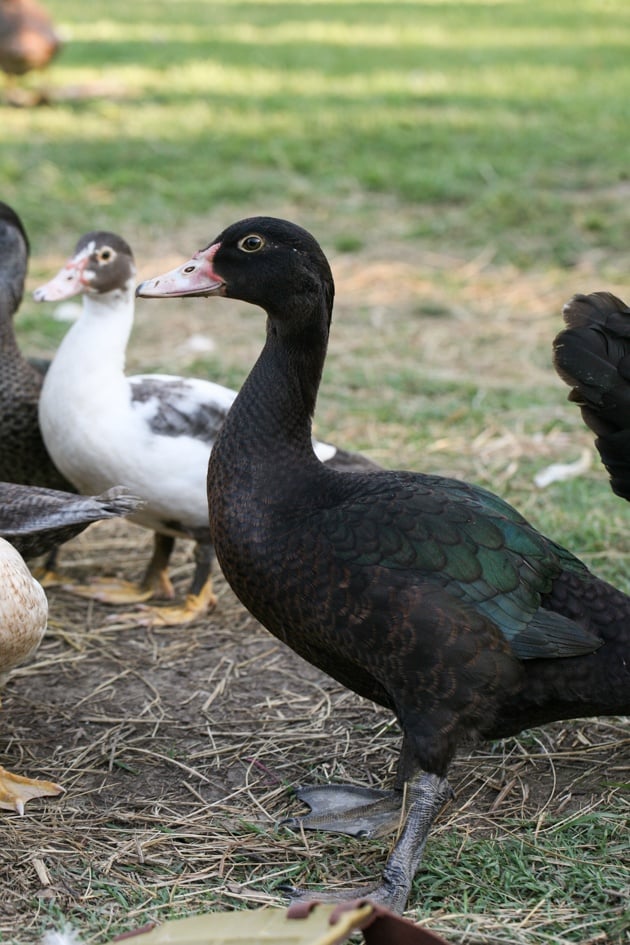
I know that this was a lot of information! Let’s make a quick list of pros and cons of owning Muscovy ducks so you can decide if they are for you…
Muscovy ducks pros –
- Friendly birds – they are friendly (apart from when they care for their babies) toward humans and other farm animals.
- They can help you control the fly and mosquito population – if you raise cows or other livestock you should consider adding a few Muscovies to the farm. They will reduce the fly population dramatically. Also, it might be a good idea to raise Muscovies in the bee yard if you keep bees. They’ll protect the hives from crawlers, wasps, and so on.
- They eat ticks and other parasites – they can help clean your yard.
- They don’t scratch or dig – as opposed to chickens, Muscovy ducks don’t scratch, dig, and make a mess.
- Great eggs – their eggs are the size of a large chicken egg. Large yolk, rich, and very tasty.
- Great meat – their meat is 98% fat-free, dark, and delicious. It is also Kosher.
- Great mothers – Muscovies will take care of their babies, saving you the need to hatch or purchase and raise ducklings.
- Quiet – they don’t quack. This may be a pro or a con for you.
Muscovy ducks cons…
- Slow, easy prey – if your ducks free-range you might lose some to predators.
- Don’t lay many eggs – around 80-100 a year.
- They fly – this might not be an issue for you but take into consideration that they can land on roofs and poop and such.
- They poop a lot – oh well, this is true for any duck… They just poop a whole lot!
I hope that this post gave you enough information to decide whether you want to raise Muscovy ducks or not. They are a great breed of duck to add to any homestead in my opinion.
If you have any questions, please feel free to post them in the comments. If you are raising Muscovy ducks please share your experience with us in the comments below.

Hi! I’m Lady Lee. I help homesteaders simplify their homesteading journey while still producing a ton of food! I am a single mother of four, I was born in Israel and raised in an agricultural commune called a Kibbutz. Now I homestead in central NC.

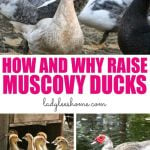
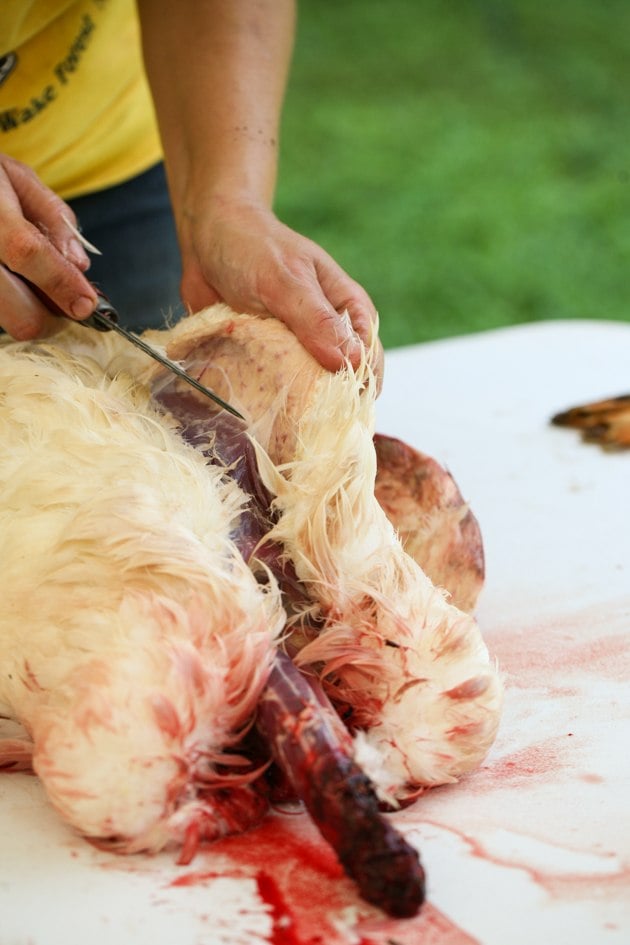
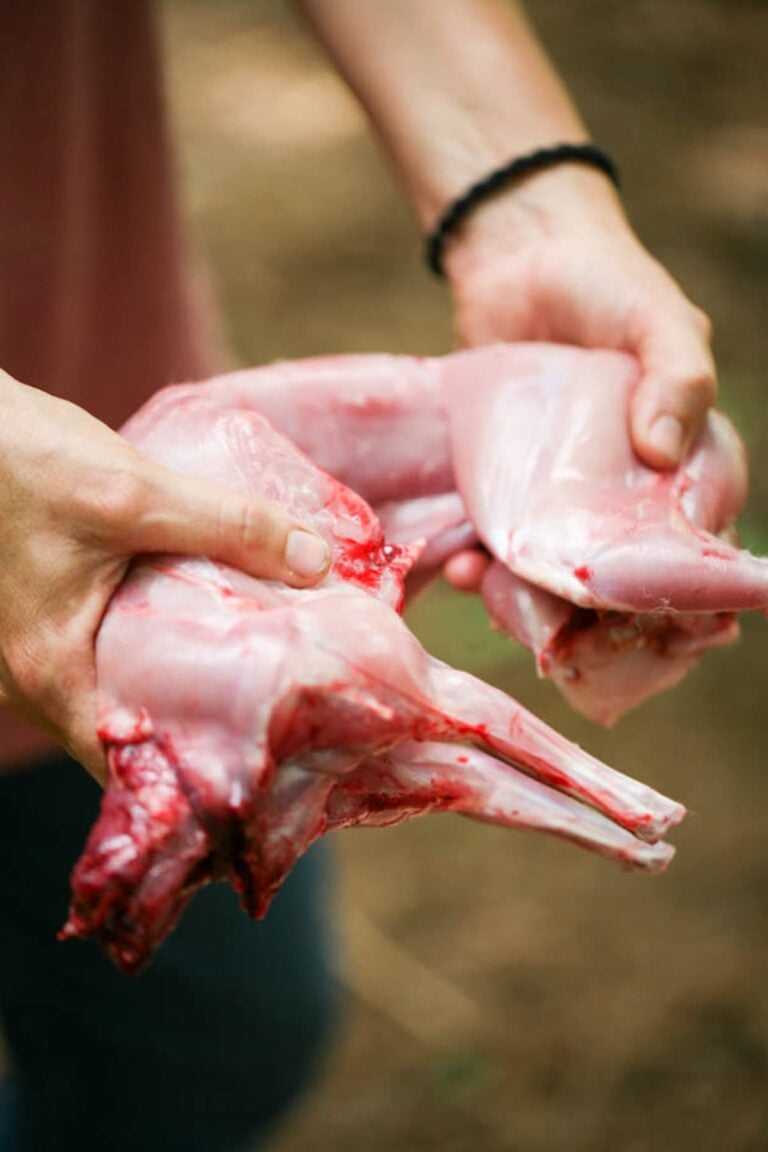
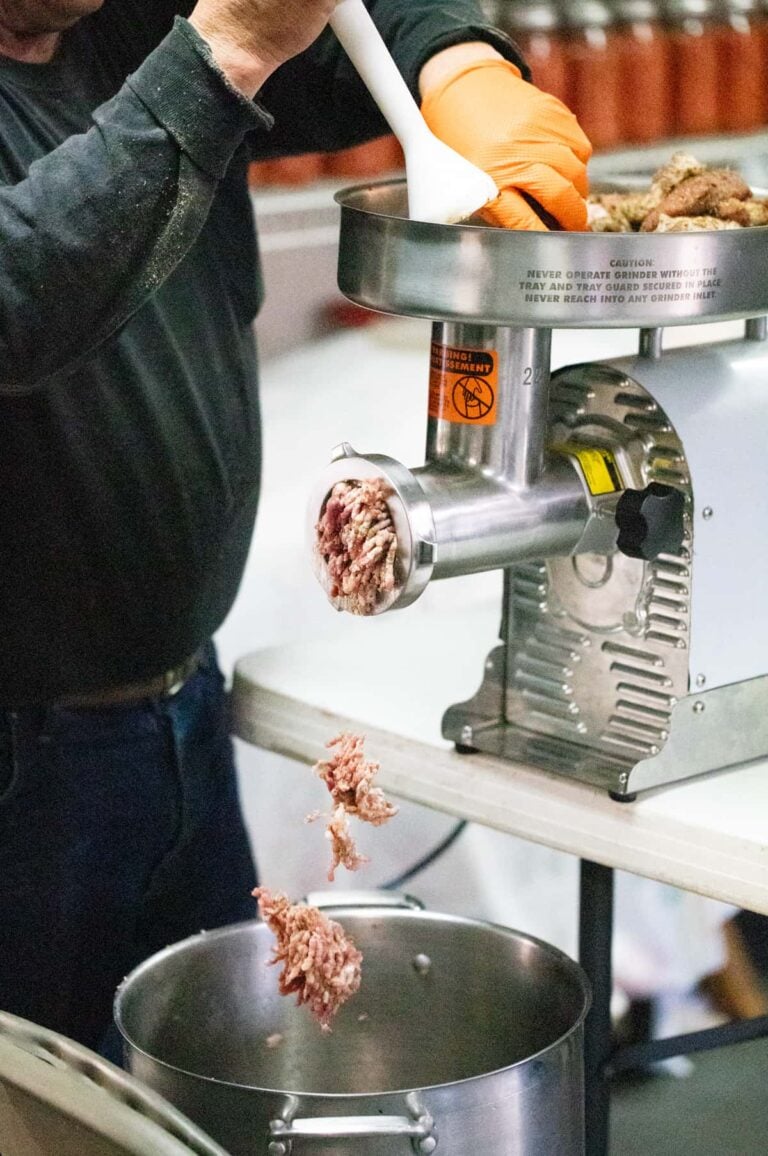
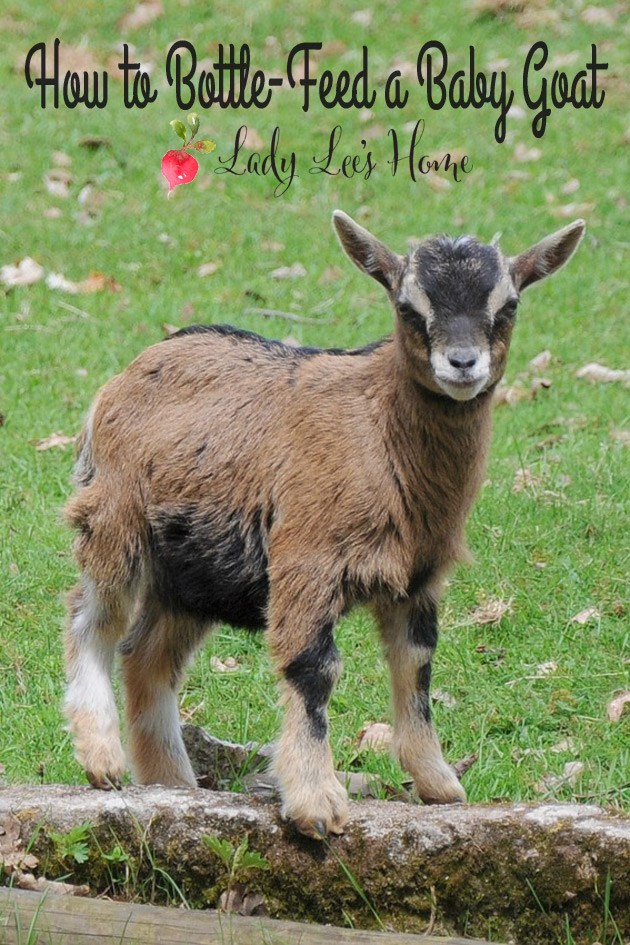
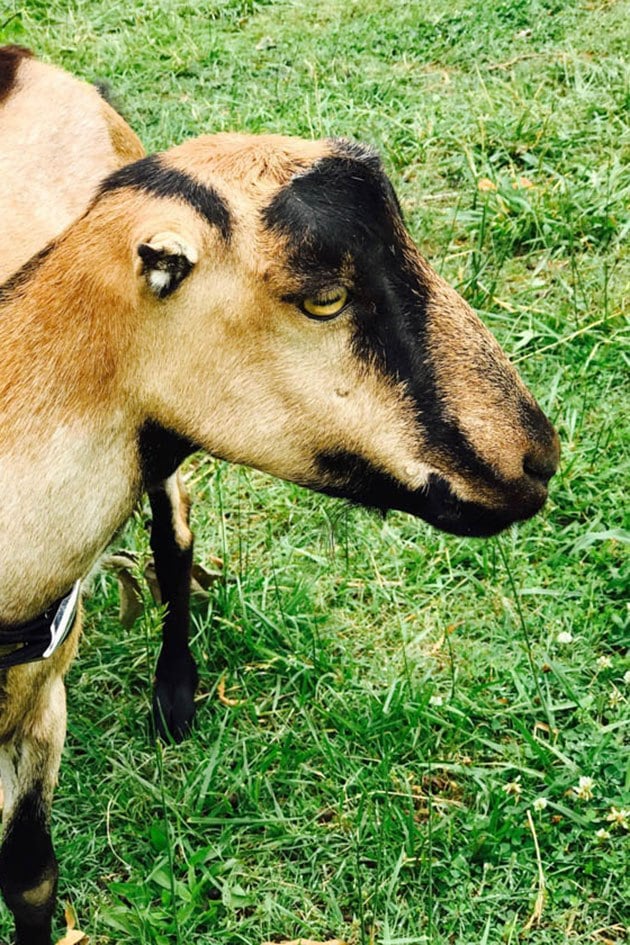
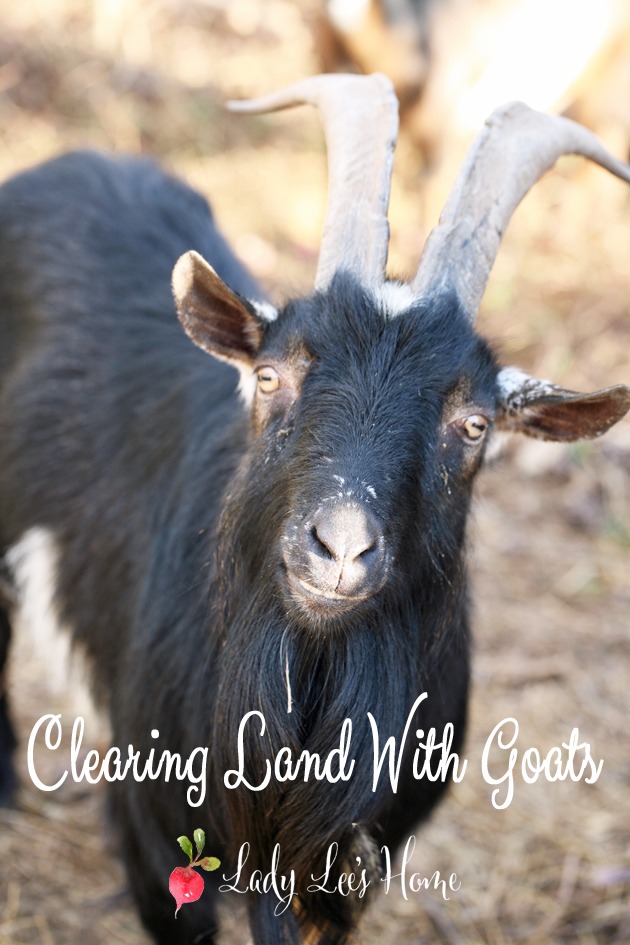
I have a backyard where a Muscovy has a nest. She is less than a year old (I know because she came by my yard each day with her mom prior to this….till 5 months old). She is sitting on her eggs now most of the time. There are 15 of them and they are 36 days old. Will they likely hatch? I wonder because the drake who made them with her is very old. He breaths heavy and has droopy caruncles….more so than the other. Does the age of the Drake affect the viability of the eggs? I should wait and see, I know but thought you may know something. thank you. Also, I do keep kosher but want to say that you need a shochet, a kosher butcher in order to make the meat kosher. Wonder if you know any in the Fort Lauderdale area. thanks again
I lived in Delray Beach for 2 years! Beautiful area. I don’t know any Kosher shochet though. I love keeping traditions but I am not really religious… I don’t like all the rules humans put on everything 🙂
Anyway, no way to know what’s in the eggs. You are just going to have to wait and see. Animals are very smart, trust her that she knows what she’s doing.
Greeting Lee.
We have a Muscovy duck that just showed up in our neighborhood. I know one of my neighbors feeds her and I would like to feed her as well. So, my question is what is best to feed her I read up in her and I have seen chicken feed mention and it also mentions bread. I am sure chicken feed would be better but would feeding her bread on occasion be okay? I say her because after reading your explanation of male vs female I am sure it is a female.
Thank for you great and informative website!
Hi Jacqueline!
If she free range you can trust that she is very capable of feeding herself and everything that you’d give her will be extra. I feed mine chicken feed (just the regular laying hens pallets) and all of our kitchen scraps. Bread is great, they love it. They also love whole corn!
Hi Lee!
I am not sure if she is free range because one day she just showed up. She has been staying around our ponds for a couple weeks and appears to be content here. I think she has been around people before because she walk toward me when she sees me. I will definitely take your food advice and will have food in hand the next time I see her!
Thank you so much for your information!
We just rescued a pair of Muscovy ducks
1. How to tell male or female?
2. Supposedly one of them was laying and since we’ve had them there has been no eggs and we have had them for about 2 weeks
Are they adults? It’s easy to recognize the male from the female if they are adults. The male is almost twice as large as the female and has more red around their eyes.
As far as laying, are they fenced or free-range? If they are free-ranging she might be hiding the eggs somewhere… If they are fenced then with most animals, major changes (like changing a place) can cause them to stop a usual behaviour like laying eggs. Sometimes it just takes them some time to adjust and relax. If she doesn’t start soon then maybe you need to check your feed. It might not be rich enough or you might not be feeding them enough.
Hello my name is alana and i have a female miscovy duck that seems to be a bit aggressive to me now. I raised her since she was born. She was abandoned in a parking lot with not mother around. I raised her indoors but i would bring her outside to swim and walk freely but doesnt like when im out of her site sometimes. She starts geting aggressive when you walk past her and she snaps quick at your toes or leg. She dont like to be held or if i fix her limp wing( angel wing) . She is sweet when she wants to be but i wish i can get the aggressiveness out of her. Is there anything you could help with?
Muscovies are pretty wild. I find that for the most part, they are slow and friendly but they still keep their guard and at the end of the day, they are smart and take care of themselves. Food always helps, maybe try to feed her from your hand and see if that’s getting her to trust you more.
Hi, I need advice from you please!! I have my two girl that had babies, one had them in October and the male had access to her and the babies so I list a few in a couple hours, now he is in is own pen. My other girl had hers in November so the mother is in with her babies in each their own for the winter and have access outside during the day at night they come in…my question is “when can I introduce them all together” cause starting spring they are all over the homestead they have 10 acres to roam around…I tried already but the mother’s were starting to fight which they never did before…I had the two hens and the drake for over a year now and it’s my first time with babies I just really love my Muscovy so I don’t want them to get hurt and fight…
And I loved reading your blog..thank you really helpful.
I’ve never separated anyone, not even when they had babies. They should be just fine if you let them out especially if they have 10 acres!
I say, let them out and just watch for a little bit. They might fight a few times but after a little bit they should be fine. Let me know.
You stated in another post that you had to stop free ranging the Muscovies. Why is that?
I’m getting ready to get six, and I don’t have a pen set up for them, since I was going to free range. Not sure what to do now.
Also, do you know if they eat and tear up the yard grass?
They don’t tear up the grass at all.
I had to fence them because they started eating mt garden. Beet tops, cantaloupe plants, peas… They started eating all these plants.
However, a few weeks ago, I set them free again. If you have a fence around your garden then it’s not a problem but I don’t. So what I do now is covering the garden rows. I either cover with agri fabric or with bird netting and it keeps them away. They don’t scratch and make a mess like chickens. They just like the greens…
I really enjoyed them free-ranging. When they free-range I have no problems with bugs, no mosquitoes, and almost no flies at all. But, the other problem that I have now is that I can’t find the eggs! I guess there are pros and cons no matter what you choose.
Oh my goodness! I don’t think that I have enjoyed a blog as much as yours. It is entertaining, friendly and full of all sorts of information. Thank you! Today we bought 4 Muskovy ducks. One male and three females. We didn’t know a whole lot about them before reading your blog and now I know a whole lot. We have other animals on our mini-farm so we are not totally clueless to raising animals for our enjoyment and to be self sustaining, so we were confident in bringing them home. It isn’t easy to get animals here where we live, so you have to jump at the chance when it comes up and learn about them on the run. From your blog, we just know these are going to be a great addition to our little farm. Thank you for sharing all of your experiences and your information.
Oh, I’m so happy you like the information and find it helpful! And thank you for the feedback and kind words!!
These ducks are amazing. They will be a great addition. Just make sure that you watch the size of the nests. You can easily go from four ducks to 50 in a season! I hope that you enjoy them. Thanks for stopping by.
Good morning: I too love my Muscovy ducks and live in a community with a large lake behind my house. My question is this. Carol (we love her) had ducklings 6 weeks ago. I found her nesting by my front door again yesterday!! There she was with her 9 ducklings laying with her in the nest. Is this possible to still have young ducklings and start laying eggs again?
Yes, definitely. They usually sit on 3 or 4 nests during the season (April to September here in the South). You can go from 3 ducks to 70 in one season!
Hoping you can help me! We took in two Muscovies as a favor to my daughters best friend. Make and female. Female is great. Make is CRAZY PROTECTIVE AND VERY AGGRESSIVE!! Sometimes he just wants food, mostly he just likes to attack me because….?? I am the only one who interacts with them. We live in a farm. Daisy laid 21 eggs, 13 hatched a week ago. Cute as they can be!! But I put her eggs in an old chicken coop, and she can come and go as she pleases. I close her and her sucklings in at night, and put up a perimeter so they can get out and explore w/o getting hurt. We have a ton of snakes, hawks, etc.
I noticed yesterday that she was nipping at one duckling in particular and constantly chasing it around the coop. It was probably the first one to “venture out…” I would find him outside of the coop all the time and have to put him back inside. I thought maybe she didn’t like me handling him, but I’ve handled most of the others over the week since they were born. He’s not hurt, eating and drinking just fine. Now she won’t even allow him in the coop. He tries to sneak in and settle on the other side away from her but as soon as she spots him she chases him away. I’m thankful I put that barrier up, so at least he will be protected from predators at night. Any thoughts as to what is causing her to shun him/her after a week? I know that if they are late hatchers, or sick, they will push them away, but this behavior just started yesterday?? I’m setting up a small box with hay, and his own food and water dish outside the coop. Thanks You for any advice!
Animals do this sometimes… I just had a goat that rejected one of her perfectly healthy kids. All we can do is monitor and keep a close eye on the babies. In nature, they would not have survived, but with us around they have a chance. If you get a male from the little babies, keep it and get rid of the mean one!
That is the plan. I was going to get rid of him months ago, but he seems to deter preying animals. He even looks ferocious. I think he was fed bread as a duckling. He has what I think is angel wing(?) but the family said he was attacked by their dog at a month old, bitten on both sides where his wings spread, and they grew like that. So, I’m not sure!
And today Daisy is even more fierce concerning this little duck. He is the smallest of the group. And he keeps his distance. I’m going to have to catch him. Im thinking about taking another one that she seems to target more than the others, this one is also smaller than the rest. They can be buddies. (I’m afraid she will wind up killing him, if I don’t move him.) That’s my project for today.!!
This is a great and informative site! Thanks for your time. Is there any way to post photos for you? I’d like to post a photo of my ducks and their daddy. (Angel wing)
I really was wanting to find where I might buy Muscovies. I enjoyed your article so I read it all. I you know of a source for Muscovies please e-mail address below.
I’ve never seen them sold online… I would say look on Craigslist, Facebook, or your local farm supply store.
awesome creatures. i thanks for the infor, i just started with five this year and i am looking forward to be enjoying a thousand of them in five years from now lol
LOL! You are not far from reality. The only thing that might prebent that is if you have them free range. They are slow and don’t fly much which makes them a great snack for the animals in the woods!
Hi! I just wanted to thank you for your time writing about the Muscoys! We live on a lake and have maybe 15 or so of them that come by daily. We just started paying attention about 6 months ago and had our first set of 6 babies come by about 4 months ago. They are here daily now because yes I feed them of course how could you not! I love them. It’s tough keeping them out of the pool and off the pool deck (hosing poop off the deck is a daily occurance in our home) but it’s worth it to have them around. Keep loving them up and we will too! Take care Jennifer
I hear from so many people who live on a pond or a lake that one day Muscovies just showed up at their yard. It’s so awesome! Thanks for stopping by and taking the time to write this!
what about hawks -owls -racoons and foxes and coyotes –if they free range will the moma fight of any hungry animal or bird
Not really. Muscovies are heavy birds and they don’t stand much chance against those predators you listed. I will admit that I’ve lost many ducklings… Ten go in the woods after mama and eight come back.
However, they always sleep at the homestead. So they might walk around the whole day and at night the mama with all her ducklings will go sleep by the hay in the feed room. They sleep under her at night. I keep my dog off the leash at night when I have ducklings and she is the one who keeps the ducks safe.
I’ve never lost ducks at night (those predators are usually active at night), but I did lose some during the day (the dog is also off the leash during the day but they go in the woods and just walk around and she isn’t always with them).
I too have raised Muscovies and like you I think that for a sustainable small livestock breed, there probably isn’t a better choice. I never had any luck letting my birds free range, though. They are just too many predators around, hawks being the worst (The only bird that I have been able to free range successfully is geese). But I never had a guard dog either. Other than that, my experiences with them have been just like yours.
My dog is the heart of the operation, seriously! I have an Australian Sheperd and she is amazing. Right now I have 30 ducklings all over the lawn and I bet they would not have survived a day if the dog wasn’t here. My chickens too. Even though they are fenced raccoons and possums are so smart! They always find a way in and they learn that there is an easy dinner around and keep coming back. All those animals don’t even try to get close when they smell a dog. I had dogs all of my life but only after I started growing my own feed I really understood why they say that a dog is man’s best friend.
Thanks for stopping by!
I had a young Muscovy duck show up one morning in my pond. After some research I found out she was a Muscovy and I bought 5 4 month old females and one 5 month old male. This was in the Fall and by the end of the next summer I had 60 ducks. Lol. I now pulled eggs and try to stay around 30 ducks. We haven’t seen any snakes since that first summer and the ticks haven’t been as bad. I enjoy having mine . I have photos of some of them in the trees around my place. They like to fly up there when they first learn to fly but after a while they stop. Enjoyed your article. Thank you.
Funny you wrote this now! I just went from 10 ducks to 40 in a week! I’m gonna have a lot of butchering to do in a few months. They stop lying because they are getting heavy, especially the males. And I have the same experience as you have, since having them I went from seeing a snake in every corner (during the summer months) to only seeing a couple during the whole season. No ticks either. I love these guys!
How do you tell a male from a female muscovy when they are young?
The tail area of the male is larger than the tail area of the female when they are ducklings. They are also larger. So if you have a male and a female the same age, you can see that the female is smaller. It’s not always easy to tell.